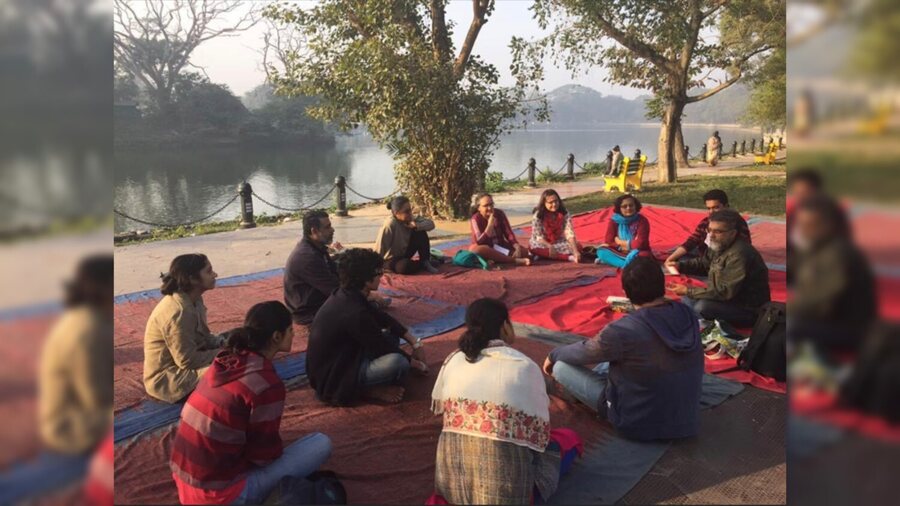When morning walkers are counting steps while looking at their wrists, a group in a Sarobar corner is counting pages read. This group – Sarobar Book Club – completed five years over the weekend.
The Book Club was born out of an unmet need. When the Sarobar was evolving into a multi-activity cultural destination a few years ago, there was an unusual suggestion: ‘Why not a Book Club?’ The job of rounding up the usual suspects was foisted on Samantak Das, now pro-vice chancellor and professor of Comparative Literature at Jadavpur University. Since he felt this new club would not last more than a couple of meetings, he casually scattered the word around (‘Jodi time paash, choley aashish’).
Theme? Kolkata, then Dreams!
The Book Club was launched around a low thematic hanging fruit called ‘Kolkata’ that virtually every attendee – 22 on that first Saturday 2017 morning – resonated with. Someone read about Kolkata from Tagore, another from Geoffrey Moorhouse; Ghalib’s ‘Kalkatte ka toonay zikr kiya jo humnasheen…’ was quoted, a Chinese perspective of the city was quoted and one attendee even ventured to articulate Gunter Grass – in German, if you please, as attendees shook their heads in fake acknowledgement.
With this bewilderingly diverse offering, one would have felt that no one would turn up for the second Book Club session 14 days later. Curiously, the word spread like a viral (not this one, silly) of an ‘Ekdom paagoler adda’; more turned up, this time armed with prose and poetry on an even more bizarre subject called ‘Dreams’. You felt that enough was enough; this nonsense would end when someone would call the emperor out for his dress sense and there would be no one rushing to take the morning cab to breathlessly breeze past the Sarobar gateman (across Menoka Cinema) at 7.29am.
Wrong. Book Club made it into its second month not as much by the virtue of its rich intellectual ferment – which was in evidence, no question – but by the virtue of two unexpected developments. A lady turned up at 8.28am dressed as if she were ready for an evening at Moulin Rouge (Paris wala!); another lady called Anchita Ghatak passed chicken sandwiches around (this provoked a debate on whether the best sandwiches east of the Suez were served at Edwards in Colaba or whether a twin mustard layer would be better than one or whether sandwiches should be eaten with the browned fringes sliced or ‘raw’). Suddenly, Book Club was the place to be seen – especially after 8.29am.
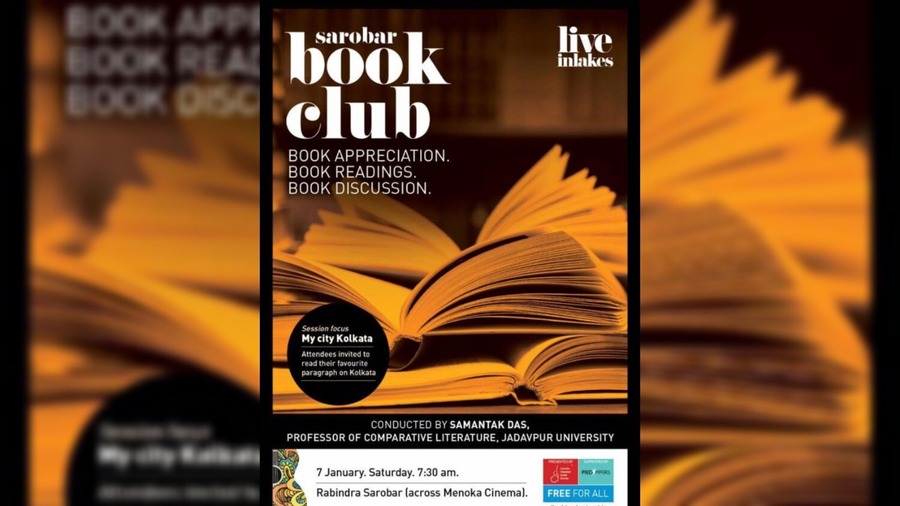
Courtesy: Mudar Patherya
As much about books as it is about everything else
This brings me to why the institution of the Sarobar Book Club has endured five years, longer than most governments in the country or post-paid tariff schemes. This Book Club is not as much about books as it is about everything else – sweeping polarisation, whether Netaji ejected just before the aircraft incinerated, whether Gopal Bose was good enough to have been non-striker to the great SMG, whether ‘Kaji’ Najrul was better than Gurudev, whether the ‘opaar’ culture was richer than ‘eipaar’, whether people who live in this state are Bengalis first and their religious denomination thereafter, whether… you get the drift. And while all this is in active ferment, someone has the gall to interrupt with ‘Shaala, cake sheshhhh?’

With this bewilderingly diverse offering, one would have felt that no one would turn up for the second Book Club session 14 days later. Curiously, the word spread like a viral (not this one, silly) of an ‘Ekdom paagoler adda’
A coming together of individuals from diverse walks
The best part about the Book Club is that it is not the Book Club and nothing but; it is the nearest equivalent of BBC Test Match Special, where the commentators (Arlott, Blofeld, Johnston, Martin-Jenkins et al) never pretended they were presiding over an international cricket contest; they were just a collection of friends having a good time with the microphone lying somewhere. Which is precisely how the Book Club has evolved: a coming together of individuals from diverse walks; one a cancer surgeon, another a doctor working in the space of public health, another an academic for the last 30 years, another a professor of German, another a student, another managing a chartered accountant firm, another…oh, you probably know what I mean. They also discuss books, quite like a famous company that also made steel. The upside is not a deepening of intellectual weightiness that makes it possible to quote Rimbaud from page 239 second para; it is lifting of the cloud on matters of critical argument (‘maatha clear hoye gechhey’).
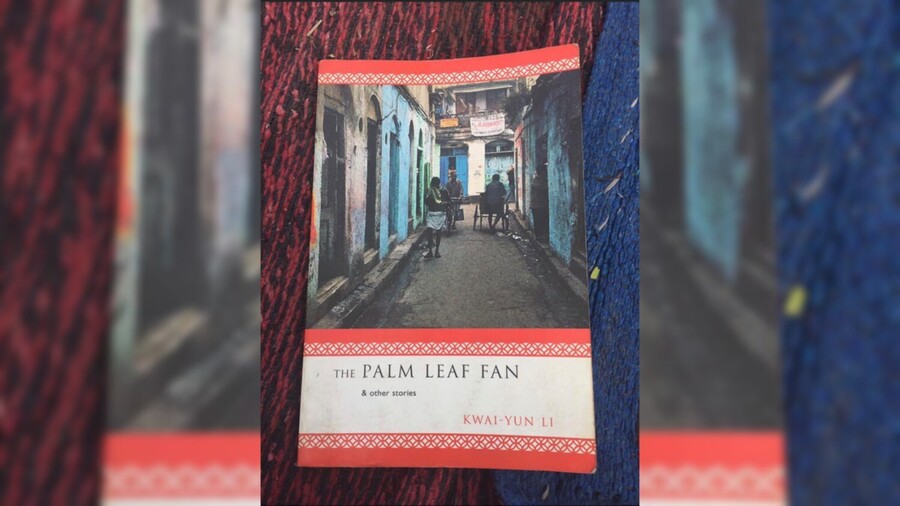
Courtesy: Mudar Patherya
Over the last five years, this Book Club has deliberated on subjects as weighty as ‘Sex’, ‘War’, ‘Dreams’, ‘Naxalites’, ‘Time’ and others. Someone has enacted a snatch from a play to prove a point; another has intoned characters from Abol Tabol; another has recited a South African poem on lesbians; another has sung a kalaam by Sahir; Yogendra Yadav dropped in to listen as much as speak.
There is a majlis-like tradition at this Book Club: readers must sit across two durries in a circle, a sadar (chief) assumes responsibility for regulating proceedings, this sadar appoints people to read one after another, readings can interpret the subject any which way (except ways that go against the spirit of universal sisterhood), attendees may read for no more than a few minutes, a log is made of who read what to be circulated on email, a quiz at the end offers incentives in the form of toffees for those who answer correctly and all this is washed down with in-meeting or post-meeting cha or other refreshments.
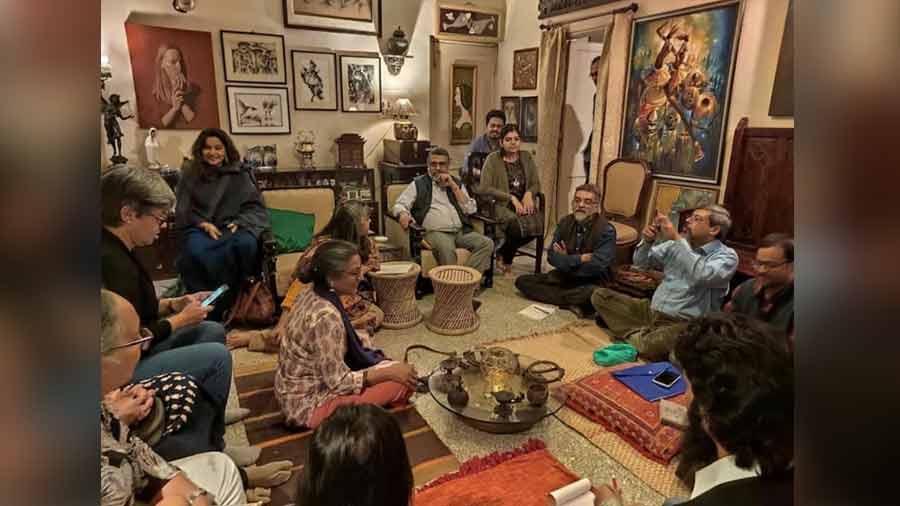
The book club in a residential setting Courtesy: Mudar Patherya
Flapping of a secular hummingbird seeking to send out a message
I have often wondered: don’t these people get tired of each other? There are a number of ways to answer: these people have stuck on because they have been bound by an underlying belief that all people have been created equal (constitutionally if not physically or economically), that Book Club engagements extend to personal friendships, that books open minds to wondrous possibilities, that in an algorithm-driven world where what I will read has been pre-decided, there can be few things more fulfilling than discussing the pain of that cartoonist who was jailed or the courage of women who camped against the NRC or the courage of the few who will not hate.

This Book Club is not as much about books as it is about everything else – sweeping polarisation, whether Netaji ejected just before the aircraft incinerated, whether Gopal Bose was good enough to have been non-striker to the great SMG, whether ‘Kaji’ Najrul was better than Gurudev, whether the ‘opaar’ culture was richer than ‘eipaar’, whether people who live in this state are Bengalis first and their religious denomination thereafter, whether… you get the drift. And while all this is in active ferment, someone has the gall to interrupt with ‘Shaala, cake sheshhhh?’
I am not sure if the folks who catch up every fortnight examine what they may be doing right. I have an inkling: they represent the flapping of a secular hummingbird seeking to send out a message to the world. That if you can debate without becoming disagreeable, a lot of the problems of this world can be solved. That if you can break bread and share cutting chai over vexing issues, there can be a meeting ground. That if you can listen to another perspective without using terms like ‘The nation demands to know’, you can unlearn and relearn.
It’s not then just another Book Club silly; it is a laboratory of people like you and me experimenting with hope.
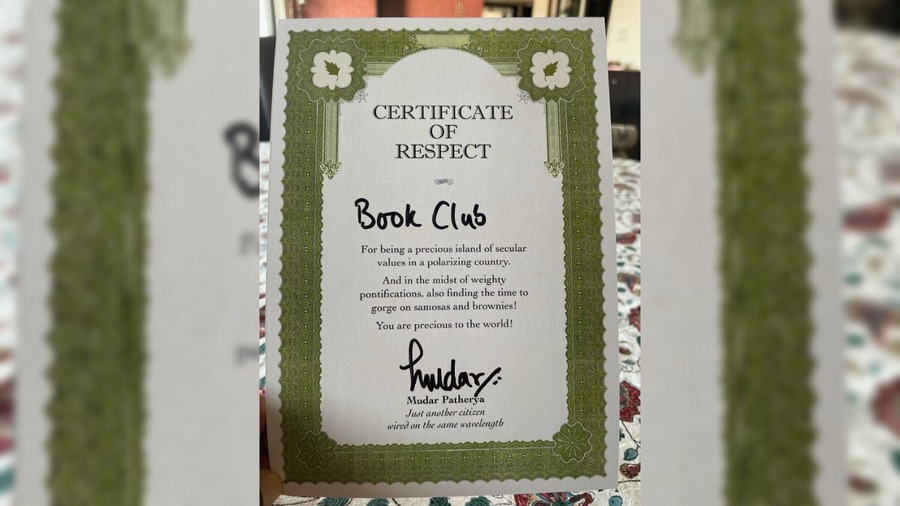
Courtesy: Mudar Patherya
Mudar Patherya is a romantic who revels in Kolkata anecdotes, pictures, bylanes, characters and memorabilia.
